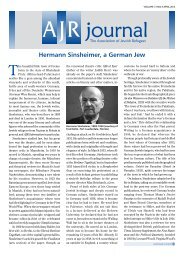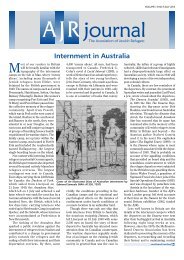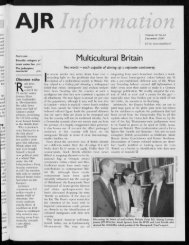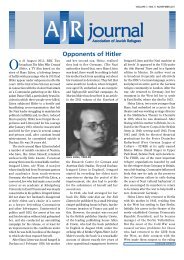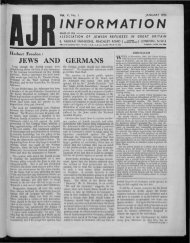INFORMATION - The Association of Jewish Refugees
INFORMATION - The Association of Jewish Refugees
INFORMATION - The Association of Jewish Refugees
You also want an ePaper? Increase the reach of your titles
YUMPU automatically turns print PDFs into web optimized ePapers that Google loves.
Page 10 AJR <strong>INFORMATION</strong> May, 1970<br />
Erich Gottgetreu (Jerusalem)<br />
" ONE HAS ALWAYS TO BEGIN ANEW..."<br />
Max Brod's Faith Reflected in a Memorial Volume<br />
One day when Max Brod felt old and<br />
weary he said he would not like to live<br />
longer than Groethe. Goethe died in his<br />
83rd year. Max Brod passed away a few<br />
weeks before he reached tlie age <strong>of</strong> 85.<br />
Thus, the anthology <strong>of</strong> essays on his Ufe<br />
and work which the historian and publisher,<br />
Dr. Hugo Gold, had prepared as a<br />
coUective gift from Brod's best friends<br />
turned to be his memorial.* A better<br />
memento is not conceivable.<br />
Max Brod was one <strong>of</strong> the most complex,<br />
productive and influential figures in<br />
two generations <strong>of</strong> <strong>Jewish</strong> letters. He<br />
expressed himself in novels and short<br />
stories, in lyrics and plays as well as in<br />
hundreds <strong>of</strong> major essays and thousands<br />
<strong>of</strong> newspaper articles. His concept <strong>of</strong><br />
" DistanzUebe" (love from a distance)<br />
between Jews and Germans or Jews and<br />
Czechs was an important contribution to<br />
Zionist ideology in pre-World War II<br />
Europe.<br />
On the other hand he became what<br />
AUce Schwartz—one <strong>of</strong> the contributors to<br />
the book—rightly calls a real " Columbus<br />
<strong>of</strong> the Arts ". Through his constant drive<br />
to discover and help other writers as well<br />
as musicians, with whom he always felt<br />
closely associated, he greatly enriched the<br />
cultural map <strong>of</strong> Europe.<br />
<strong>The</strong> volume succeeds in reflecting the<br />
fertility and versatUity <strong>of</strong> Max Brod's work<br />
—a many-sidedness and a cosmopolitan<br />
outlook which really gave his life a certain<br />
Goethe touch. At the same time, it<br />
contains a great deal <strong>of</strong> human interest<br />
material which may be particularly<br />
important to future biographers, though<br />
his own autobiography, " Streitbares<br />
Leben", wiU always remain their main<br />
source.<br />
Last but not least, the memorial book<br />
demonstrates Max Brod's philosophical<br />
views and his faith in the ethical destiny<br />
<strong>of</strong> man. Guided by his friend FeUx<br />
Weltsch, in whom he saw one <strong>of</strong> the major<br />
thinkers <strong>of</strong> modern times, he was always<br />
an ardent believer in the ethical content<br />
<strong>of</strong> Judaism. It is typical <strong>of</strong> him that he<br />
grew angry at the various attempts to<br />
interpret Kafka—^whom he had discovered<br />
and whose work he bad twice saved from<br />
destruction — as a prophet <strong>of</strong> nihilism<br />
and despair. He saw in Kafka's work<br />
a caU to resist temptation, to overcome<br />
evil, to continue the search for the end<br />
<strong>of</strong> the night — though there wiU never<br />
be perfection, never an end to the quest.<br />
It was in that sense that Brod entitled his<br />
last book, which was to become his farewell<br />
message to life, " Das Unzerstoerbare<br />
" (<strong>The</strong> Indestructible) and that only<br />
a few weeks before his death, he wrote<br />
in a letter to Dr. Robert Weltsch : " One<br />
has always to begin anew."<br />
Brod's major novels are analysed by<br />
various writers, among them Schalom<br />
Ben-Chorin <strong>of</strong> Jerusalem, who chose as<br />
his subject "<strong>The</strong> First Fifty Years—the<br />
Poet and Philosopher <strong>of</strong> Modern<br />
Judaism ", and the philologist Gitta Fazi,<br />
whose essay on " Max Brod seen from<br />
Israel " largely deals with the books he<br />
wrote after his emigration in 1939 at the<br />
* Max Brod—ein Qedcnkbuch (18S4-1969). Herausgegeben<br />
von Dr. Hugo Gold. Verlag Olamenu, Tel Aviv,<br />
age <strong>of</strong> 55. It might be added that Mrs.<br />
Pazi, born in Czechoslovakia and now a<br />
resident <strong>of</strong> Tel Aviv, has recently submitted<br />
her doctor thesis on Max Brod's<br />
work to Wuerzburg University in Bavaria.<br />
Various essays deal in a more specialised<br />
way with some <strong>of</strong> the author's over<br />
a hundred books. Dr. Hans Tramer (Tel<br />
Aviv) writes about " Mira ", a novel dedicated<br />
to the memory <strong>of</strong> the Viennese poet,<br />
Hugo von H<strong>of</strong>mannsthal, whom Brod held<br />
in great veneration. <strong>The</strong> German literary<br />
historian Paul Raabe chose some <strong>of</strong> Brod's<br />
earliest writings for a closer look in connection<br />
with their position in the expressionist<br />
movement. Sigrid Brunk, also<br />
a German writer, has illuminating things<br />
to say on Brod's largely autobiographical<br />
short stories which intersperse the flow<br />
<strong>of</strong> his novels. Pr<strong>of</strong>essor Johannes Urzidill<br />
(U.S.A.) a Prague friend <strong>of</strong> Brod and<br />
Kafka, writes about " Cervantes and<br />
Kafka ", Pr<strong>of</strong>essor Walter A. Berendsohn<br />
(Stockholm) writes about Brod's book on<br />
the militant German humanist Johannes<br />
Reuchlin, who as early as 1506 published<br />
his " Rudimenta Judaica ", a Hebrew dictionary<br />
and grammar, and who fought the<br />
baptised ex-Jew Johannes Pfefferkorn and<br />
the Dominican monks <strong>of</strong> Cologne because<br />
<strong>of</strong> their persecution <strong>of</strong> the Hebrew language.<br />
Brod made a very thorough study<br />
<strong>of</strong> Reuchlin as he felt that a new presentation<br />
<strong>of</strong> this humanist to our generation<br />
might help to promote inter-human,<br />
inter-religious and international relations<br />
and, specifically, to re-estabUsh<br />
sound, dignified relationship between<br />
Germans and Jews.<br />
HOUSE OF HALLGARTEN<br />
Specialist<br />
Fine Wines<br />
Shippers<br />
Unique Liqueurs<br />
// you enjoy wines<br />
write hr our latest free list<br />
which is full <strong>of</strong> fascinating<br />
information, maps, vintage reports<br />
and charts, descriptions, wines<br />
for laying down<br />
HOUSE OF HALLGARTEN<br />
1, Crutched Friars, London, E.C.3<br />
Choose Hallgarten — Choose Fine Wines<br />
Brod's urge to contribute to the humanisation<br />
<strong>of</strong> life, and to become an active<br />
philosopher in the Platonic sense, was so<br />
great that he even ventured into political<br />
Ufe, though he was basically a non-poUtical<br />
man with no taste for the unavoidable tactical<br />
manoeuvres and machinations <strong>of</strong> poUtics.<br />
A significant example is contributed<br />
by Dr, Moshe Tavor (Jerusalem) who descrtibes<br />
the pr<strong>of</strong>ound educational influence<br />
Brod had on the <strong>Jewish</strong> youth <strong>of</strong><br />
newly-founded Czechoslovakia after World<br />
War I, not only in Prague but also in the<br />
provincial towns which he visited as a<br />
Zionist orator or reached as a publicist.<br />
Brod's reluctance to engage in daily polemics<br />
in the market place, Tavor says, was<br />
more than compensated by his promotion<br />
<strong>of</strong> the basic tenets <strong>of</strong> the <strong>Jewish</strong> national<br />
idea.<br />
<strong>The</strong> exceptional occasion on which Brod<br />
felt forced to enter the political arena and<br />
to support the <strong>Jewish</strong> cause on the practical<br />
political level is described by Meir<br />
Faerber (Tel Aviv), like Brod himself a<br />
former Czechoslovak citizen. After the collapse<br />
<strong>of</strong> the Austrian Monarchy, Faerber<br />
recalls, Brod became a member <strong>of</strong> the<br />
<strong>Jewish</strong> National Council in Prague which<br />
called upon the representatives <strong>of</strong> the<br />
Czech people to give the <strong>Jewish</strong> minority<br />
equal rights in the newly-founded State <strong>of</strong><br />
Czechoslovakia. <strong>The</strong>se demands were later<br />
largely respected by the country's first<br />
President, Pr<strong>of</strong>. Thomas Masaryk.<br />
<strong>The</strong> Max Brod memorial volume is<br />
rounded <strong>of</strong>f by several essays illustrating<br />
the background <strong>of</strong> some <strong>of</strong> his works, as<br />
well as by various lighter pieces consisting<br />
<strong>of</strong> personal recollections.<br />
<strong>The</strong> " backgrounders" are topped by<br />
Pr<strong>of</strong>. Ernest Simon's magnificent essay on<br />
the different trends in modern <strong>Jewish</strong><br />
historiography which is undergoing a<br />
change m outlook and interpretation as<br />
the result <strong>of</strong> the <strong>Jewish</strong> national renaissance.<br />
Another most interesting essay in<br />
this section is Pr<strong>of</strong>. Gershom Scholem's<br />
account <strong>of</strong> the mystic Moses Dobrushka,<br />
born in 1753 in Brno and guiUotined in<br />
Paris in 1794, on whom Brod collected<br />
sorna rnaterial when he intended to write<br />
an historical novel on the Bohemenian adherents<br />
<strong>of</strong> Jakob Frank. Dobrushka, one <strong>of</strong><br />
the most fervent Frankists, was a founder<br />
<strong>of</strong> the mystic "Order <strong>of</strong> the Asian Brothers<br />
in Europe". Brod gave up the idea <strong>of</strong> the<br />
Dobrushka novel when he realised that it<br />
v'T- too difficu't to f?et c'ose to the sources.<br />
(When he later decided to write on Reuch<br />
Un, he was not deterred by similar difficulties<br />
but conducted research over several<br />
years ; obviously the implications <strong>of</strong> this<br />
theme were much more important to him.)<br />
Fascinating personal memories have<br />
been contributed by his secretary for<br />
many years, Mrs. Use Ester H<strong>of</strong>fe, the<br />
German-<strong>Jewish</strong> writers Hermann Kesten<br />
and Dr. Willy Haas, and by Dr, Iwan<br />
Lilienfeld, Editor <strong>of</strong> "Yedioth Chadashoth<br />
" in Tel Aviv, for which Brod wrote<br />
thoughtful music criticism.<br />
Yehuda Cohen <strong>of</strong> Tel Aviv provides a<br />
valuable analysis <strong>of</strong> Brod's own musical<br />
compositions comprising some eighty lieder<br />
as weU as various works for piano and<br />
some orchestral music.<br />
A full Brod bibUography ranging from<br />
1906 tiU 1968 has been contributed by<br />
Zeev Barth in co-operation with Gitta Pazi.<br />
One cannot but be awed by the magnitude<br />
<strong>of</strong> Max Brod's life work and the enduring<br />
contribution <strong>of</strong> his ideas to <strong>Jewish</strong> thought<br />
<strong>of</strong> our time.



